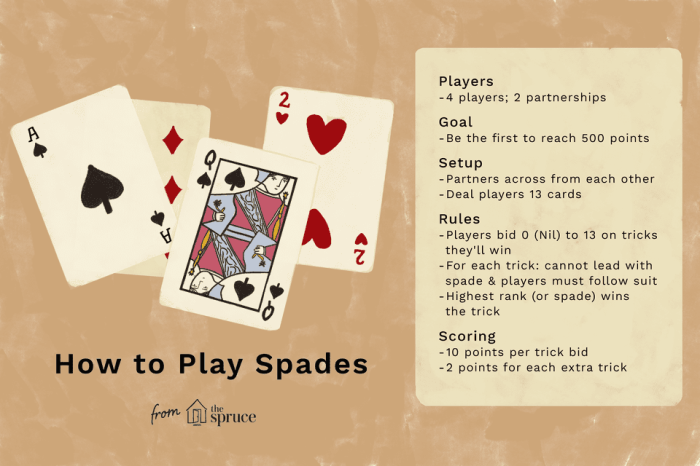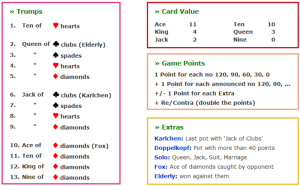
Embark on a journey to master card game rules with precision and finesse. Dive into the world of strategic gameplay and rule mastery.
Discover the key strategies, tips, and techniques to elevate your card game skills to new heights.
Understanding Card Game Rules
Understanding the rules of a card game is crucial before diving into gameplay. It sets the foundation for a fair and enjoyable gaming experience.
Importance of Thoroughly Understanding the Rules
- Prevents confusion and disputes during gameplay.
- Allows for strategic planning based on the rules.
- Ensures a level playing field for all participants.
Strategies for Effectively Memorizing Complex Card Game Rules
- Read the rules multiple times to familiarize yourself with them.
- Practice by playing mock games to apply the rules in action.
- Create cheat sheets or flashcards for quick reference.
Enhancing Gameplay Experience with Solid Rule Grasp
- Enables you to make informed decisions during gameplay.
- Promotes a smoother flow of the game without constant rule checking.
- Encourages strategic thinking and skill development over time.
Learning New Card Games

Learning a new card game can be an exciting challenge that opens up a whole new world of strategies and fun. Here are some tips on how to approach learning the rules of a new card game:
Approach to Learning New Card Games
- Start by reading the rulebook thoroughly to understand the basic mechanics and objectives of the game.
- Watch tutorial videos or play-throughs online to visually see how the game is played.
- Try to find someone experienced in the game to teach you or play with you to learn through hands-on experience.
- Practice playing the game solo to familiarize yourself with the rules and strategies.
Mastering Rules for Different Types of Card Games
- For traditional card games like Poker or Bridge, mastering the rules involves understanding the hierarchy of hands and specific gameplay mechanics.
- For deck-building games like Magic: The Gathering or Keyforge, mastering the rules includes understanding card interactions, deck construction, and strategic gameplay.
- For party card games like Cards Against Humanity or Exploding Kittens, mastering the rules involves creating a fun and engaging atmosphere while following the game’s guidelines.
Benefits of Expanding Your Repertoire of Card Games
- Expanding your repertoire of card games can keep your gaming experience fresh and exciting, preventing boredom from playing the same game repeatedly.
- Learning new card games can improve your cognitive skills, such as critical thinking, problem-solving, and strategic planning.
- Playing a variety of card games can help you socialize and connect with different people who share your interest in gaming.
Strategies for Mastering Card Game Rules
Mastering card game rules can be a challenging task, especially when dealing with complex games. However, by utilizing effective strategies, you can break down these rules into more manageable parts and deepen your understanding through practice and teaching others.
Breaking Down Complex Rules
- Start by focusing on the basic rules and objectives of the game.
- Identify any special cards, actions, or exceptions that may deviate from the standard rules.
- Break the rules into sections and tackle one section at a time to avoid feeling overwhelmed.
- Use visual aids or diagrams to help visualize the gameplay and interactions between cards.
Role of Practice and Repetition
- Practice playing the game regularly to reinforce your understanding of the rules.
- Repetition helps to solidify the rules in your memory and allows you to anticipate different scenarios during gameplay.
- Reflect on your mistakes and learn from them to improve your grasp of the rules.
- Engage in mock scenarios or solo plays to test your knowledge and enhance your problem-solving skills.
Teaching Others for Deeper Understanding
- Explaining the rules to someone else requires you to articulate and organize your thoughts, reinforcing your own understanding.
- Teaching others can reveal gaps in your knowledge and prompt you to revisit and clarify certain rules.
- Answering questions from beginners can challenge you to think critically about the rules and their applications.
- Engaging in discussions about the rules with fellow players can provide new perspectives and insights that deepen your understanding.
Handling Rule Disputes

When playing card games, rule disputes may arise, leading to conflicts among players. It is essential to address these disputes effectively to maintain a fair and enjoyable gaming experience.
Steps to Effectively Resolve Rule Disputes
- First, remain calm and avoid escalating the situation. Emotions can cloud judgment and make it harder to find a resolution.
- Consult the rulebook or any official sources to clarify the disputed rule. Having a clear reference can help in resolving disagreements.
- If the rule remains unclear, consider seeking consensus among all players or involving a neutral third party to provide a ruling.
- Focus on finding a compromise that is acceptable to all parties involved. Remember that the goal is to continue playing in a fair and sportsmanlike manner.
Importance of Sportsmanship in Rule Disputes
Sportsmanship plays a crucial role in handling rule disputes. It is essential to maintain respect for fellow players and the integrity of the game when clarifying or enforcing rules. Keeping a positive and fair attitude can prevent conflicts from escalating and ensure a harmonious gaming environment.
Examples of Common Rule Disputes and Prevention
| Common Dispute: Misinterpretation of a card’s effect | Prevention: Clearly communicate card effects before gameplay starts and refer to the rulebook for clarification. |
| Common Dispute: Disagreement on the order of play | Prevention: Establish turn procedures at the beginning of the game and remind players of the sequence during gameplay. |
| Common Dispute: Confusion over scoring methods | Prevention: Review scoring rules together before starting the game and address any uncertainties beforehand. |
Improving Rule Retention
To enhance your ability to retain card game rules over time, it is essential to practice and reinforce your understanding of the rules regularly. By revisiting the rules periodically, you can solidify your knowledge and prevent forgetting key aspects of the game. Additionally, using mnemonic devices or memory aids can help you remember complex rules more effectively.
Benefits of Revisiting Rules Periodically
- Reinforces understanding: Regularly revisiting card game rules helps reinforce your understanding and prevents forgetting important details.
- Improves retention: By reviewing the rules frequently, you are more likely to remember them accurately during gameplay.
- Enhances strategic gameplay: A thorough understanding of the rules allows you to develop more effective strategies and make better decisions during the game.
Mnemonic Devices for Remembering Complex Rules
Using mnemonic devices can be a helpful way to remember complex card game rules. Here are some examples:
- Acronyms: Create acronyms using the first letter of each rule to help you recall them in order.
- Visual cues: Associate specific rules with images or visual cues to trigger your memory during gameplay.
- Rhymes or songs: Turn the rules into a catchy rhyme or song to make them easier to remember.
- Memory palace technique: Create a mental map of the game rules in a familiar place to help you recall them more effectively.
Exploring Advanced Rule Sets
Mastering advanced rule sets in card games presents both challenges and benefits for players looking to enhance their skills and understanding of the game.
Understanding intricate rule variations can be daunting, but it allows players to explore new strategies, improve decision-making, and elevate their overall gameplay experience. Advanced rules often introduce unique mechanics and interactions that add depth and excitement to the game, keeping players engaged and constantly learning.
Resources for Understanding Advanced Rules
- Rulebooks and Official Websites: Many card games have detailed rulebooks or official websites that provide in-depth explanations of advanced rules and variations.
- Online Forums and Communities: Joining online forums or communities dedicated to specific card games can be a valuable resource for discussing and clarifying advanced rules with experienced players.
- Video Tutorials and Gameplay Videos: Watching video tutorials and gameplay videos can help visualize how advanced rules are applied in actual gameplay scenarios, making it easier to grasp complex concepts.
- Strategy Guides and Articles: Reading strategy guides and articles written by expert players can offer insights into advanced tactics and rule interactions, helping players improve their understanding and decision-making.
Benefits of Advanced Rules in Gameplay
-
Advanced rules can introduce new dimensions of strategy, allowing players to explore different approaches and tactics to outsmart their opponents.
- They can create a more challenging and rewarding gameplay experience, pushing players to think critically and adapt to evolving situations.
- Advanced rules can enhance replay value by introducing variety and complexity, keeping the game fresh and engaging even after multiple playthroughs.
- They promote continuous learning and skill development, encouraging players to delve deeper into the game mechanics and improve their overall performance.
Adapting to Rule Changes
Adapting to rule changes in familiar card games can be challenging but essential for staying competitive and enjoying the game to its fullest. Understanding how rule modifications impact gameplay dynamics and strategies is crucial to thriving in the ever-evolving world of card games. Successful adaptation to new rules requires flexibility, strategic thinking, and a willingness to learn and adjust.
Strategies for Adapting to Rule Changes
- Stay informed: Keep up-to-date with rule changes by reading official game updates, forums, and rulebooks.
- Practice with new rules: Playtest the updated rules with friends or online to familiarize yourself with the changes.
- Adapt your strategy: Analyze how the rule changes affect your usual gameplay tactics and adjust your strategy accordingly.
- Seek advice: Discuss the new rules with experienced players to gain insights and tips on adapting effectively.
Impact of Rule Changes on Gameplay Dynamics and Strategies
Rule changes can drastically alter the flow and balance of a card game, affecting the effectiveness of certain strategies and tactics. For example, a rule change that limits the number of cards a player can draw per turn can shift the focus from card advantage to board control. Understanding these shifts is key to adapting your gameplay and staying competitive.
Examples of Successful Adaptation to Rule Modifications
One notable example of successful adaptation to rule changes is in the game Magic: The Gathering. When new card sets are released, players quickly adapt their decks and strategies to incorporate powerful new cards and synergies, staying ahead of the competition. This ability to adapt to rule changes has helped Magic: The Gathering remain a dynamic and engaging game for players of all skill levels.
Balancing Fun and Rules
When it comes to card games, finding the perfect balance between having fun and following the rules is essential. Players should be able to enjoy the game while still respecting the guidelines in place. Here are some tips to help maintain a harmonious gaming experience:
Tips for Maintaining Fun and Respect for Rules
- Always prioritize the enjoyment of the game over winning at all costs. Remember that games are meant to be fun and entertaining for everyone involved.
- Communicate openly with other players about the rules and ensure that everyone is on the same page. This can help prevent misunderstandings and disputes.
- Be willing to adapt and compromise when necessary. Sometimes, strict adherence to rules can hinder the overall enjoyment of the game.
- Encourage a positive and friendly atmosphere during gameplay. Respect for rules should not overshadow the camaraderie and sportsmanship among players.
Mastering card game rules is the gateway to unlocking a world of thrilling gameplay and strategic depth. With dedication and practice, you’ll soon become a formidable player in any card game you encounter.
Q&A
How important is it to understand card game rules before playing?
Understanding the rules is crucial as it sets the foundation for a fair and enjoyable gameplay experience.
What are some tips for retaining card game rules over time?
Revisiting rules periodically and using mnemonic devices can help reinforce your understanding of card game rules.
How can one effectively resolve rule disputes during gameplay?
Communicating calmly and referring to the rulebook can help resolve disputes in a fair and efficient manner.





